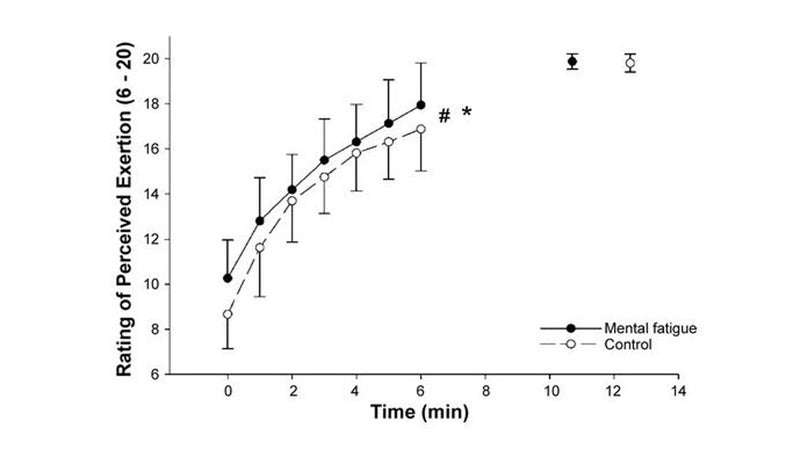For obvious reasons, one of the hottest lockdown training topics these days is how quickly you lose fitness when your workouts are curtailed (as discussed, for example, in from a couple of the world’s experts on the topic). But none of that data really explains how sharply my regular Saturday morning tempo runs have cratered. I’ve gotten much slower very abruptly, and I’m pretty sure it has more to do with what’s going on in my head than what’s happening in my muscles.
That’s consistent with a line of research that shot to prominence back in 2009, when a research team led by Samuele Marcora, then at Bangor University in Wales, in the Journal of Applied Physiology called “Mental fatigue impairs physical performance in humans.”
In Marcora’s study, volunteers spent 90 minutes either playing a very simple computer game that demanded sustained attention and fast reactions, or watching documentaries (“World Class Trains: The Venice Simplon Orient Express” and “The History of Ferrari: The Definitive Story,” if you must know). Then they hopped on an exercise bike and rode to exhaustion at a predetermined power output.
Most of the measurements were identical in the two conditions: heart rate, oxygen consumption, lactate, cardiac output, and so on. Playing the computer game hadn’t tired the subjects out in any physical way. But their mental fatigue was higher, and as a result, their perception of effort was higher from the moment they started pedaling the bike. Here’s their self-rated perception of effort during the bike trial, on a scale of 6 (no effort) to 20 (maximal effort):

You can see that effort in the mentally fatigued condition is almost two points higher right from the start, and the gap persists throughout the trial. The final measurements before exhaustion are shown on the upper right: in both cases, the riders give up when their perceived effort approaches the maximum of 20, exactly as you’d expect. But the mentally fatigued riders, who started with a higher perception of effort, reach that threshold earlier. On average, they quit about 15 percent earlier—a pretty big difference, which according to one theory results from the accumulation of a brain chemical called adenosine.
In the years since that study, mental fatigue has become a huge focus of attention among coaches, trainers, and applied sports scientists trying to figure out how to mitigate its effects on their athletes. But there have been some lingering questions. While numerous studies have explored the effects of mental fatigue on sports ranging from ���ٴ� , not all of them have seen performance changes.
Intriguingly, that compared professional and amateur cyclists found that the amateurs got slower after a 30-minute bout of brain-sapping computer games, but the pros didn’t. Perhaps elite athletes, with their grueling training regimens, build up a functional immunity to mental fatigue? Also, a few studies have indirectly hinted that women might take a bigger performance hit from mental fatigue than men, but (predictably) no one actually measured sex differences.
Into that gap comes , from Brazilian researchers led by Bruno Moreira Silva of the Federal University of São Paulo. Their study follows a protocol similar to the one in Marcora’s 2009 experiment: a mentally fatiguing computer task or watching a documentary, followed by a time-to-exhaustion test lasting about six minutes, this time on a treadmill. A couple of key differences: the mental fatigue task was 45 minutes (compared to 90 minutes in Marcora’s original study and 30 minutes in the Australian study), and the subjects (15 women and 16 men) were all Brazilian professional track and field athletes competing at distances ranging from 800 meters to the marathon.
The mental fatigue challenge was something called the Stroop task. A color word—“blue,” for example—flashes on the screen. Sometimes the color of the letters matches the word, e.g. the word “blue” is shown in blue; other times it doesn’t, e.g. the word “blue” is shown in red. Subjects had to hit one of several buttons as quickly as possible, with the correct response sometimes corresponding to the word and other times corresponding to the font color. After a certain point, you’re guaranteed to feel like you’ve gone crazy.
The main result was that mental fatigue did indeed hurt performance in the endurance test, even though none of the physiological variables like heart rate, lactate, and oxygen consumption were affected. Endurance time was reduced on average by 6 percent in the women and 3 percent in the men—a result that, statistically speaking, did not indicate a significant difference in male and female response to mental fatigue.
The contrast with the previous study of elite cyclists, where 30 minutes of mental pre-fatigue didn’t hurt cycling performance, is interesting. It could simply be that elite athletes require a bigger dose of mental fatigue before their performance suffers. That is, in fact, why the Brazilian researchers chose to bump up the dose to 45 minutes. Or it could be that there were subtle differences between the athletes in the two studies, or in the details of the mental fatigue or exercise protocols. Given that there have been a bunch of conflicting results in the field, studies like this are important in the ongoing effort to pinpoint when mental fatigue matters and when it doesn’t.
The male-female data is a little harder to parse. Based on earlier studies, the researchers hypothesized that the effect of mental fatigue on performance would be bigger in women than men. One interpretation of the results is that they were wrong, and there are no male-female differences. Another possibility, the researchers suggest, is that the study’s selection criteria effectively washed out potential sex differences. All the subjects in the study, both male and female, were elite athletes undergoing intense training, living disciplined lives, and enduring regular discomfort. These similarities presumably give them a high threshold for resisting mental fatigue, which may trump any subtle (and hypothetical) differences in how male and female brains process mental fatigue.
The bottom line is that mental fatigue can affect even the most elite athletes. What to do about that—a mental taper before competitions? special ?—remains a topic for discussion and research. For now, I just find it helpful to be aware that it matters. There’s a lot going on in my life, and in the world at large, right now. My mind is doing a lot of spinning. And my tempo runs are slower. There’s a connection there, and that’s okay.
For more Sweat Science, join me on �����Ի� , sign up for the , and check out my book .


